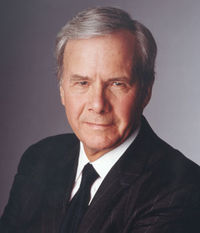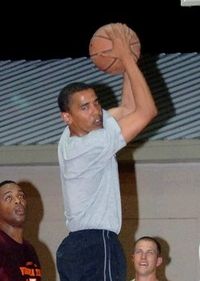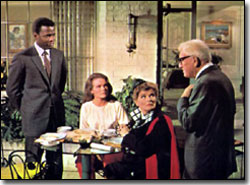"That speech won't scour." Perhaps the dumbest thing Abraham Lincoln ever said.
He was referring to his own Gettysburg Address, a 3-minute letter following three hours of Edward Everett's best.
What Lincoln didn't realize, what history teaches, is that the importance of a great speech may not be seen close up or right away, even by the speaker.
Barack Obama has called us all to service, so today I was performing a very American service, jury duty. I was chosen, given barely an hour to grab lunch, and let loose into the Decatur, Georgia chill (rushing past a Confederate obelisk shaped like the Washington Monument), in search of a TV.
I knew of a sports bar and ran for it. It was packed to the rafters, every TV on the man at the center. I arrived just before the oath, then watched The Speech.
It was short. It did not seem like much at the time. But as with Lincoln's best, it scoured.
UPDATE: Glad to know someone writing for The New York Times finally agrees with me. "Canonization has already arrived," he concludes. Amen.
Obama used both song lyrics and short quotations to weave our new beginning.
On this day, we come to proclaim an end to the petty grievances and false promises, the recriminations and worn-out dogmas that for far too long have strangled our politics. (Notice the repetition.)
We remain a young nation, but in the words of Scripture, the time has come to set aside childish things.
Great poetry. Then note how he weaves Vietnam into the American story, and uses one of my favorite phrases in this blog, that we are a nation of makers.
It has been the risk-takers, the doers, the makers of things — some celebrated, but more often men and women obscure in their labor — who have carried us up the long, rugged path towards prosperity and freedom.
For us, they packed up their few worldly possessions and traveled across oceans in search of a new life.
For us, they toiled in sweatshops and settled the West, endured the lash of the whip and plowed the hard earth.
For us, they fought and died in places Concord and Gettysburg; Normandy and Khe Sahn. (Again, note the repetition.)
The President understood that a speech like this gets chopped like hamburger. Every bite had to be delicious. And no matter where you spliced it, you got great phrases.
So-called experts like Tom Brokaw, who criticized it because it didn't have "great phrases" said this only because the great phrases are not yet a sacred part of our national vocabulary the way "The only thing we have to fear" or "Ask not what your country can do for you."
Those phrases are great because they have been memorized by generations. As this speech will be memorized by future generations. So he kept it short and gave it musical tag lines.
"We must pick ourselves up, dust ourselves off, and begin again…What the cynics fail to understand is that the ground has shifted beneath them…The question we ask today is not whether our government is too big or too small, but whether it works."
Note how each one of the above bits has been said before. The President brought them up to date and into new contexts.
There are so many great sentences here.
"Our spirit is stronger and cannot be broken. You cannot outlast us, and we will defeat you. For we know that our patchwork heritage is a strength, not a weakness. We have tasted the bitter swill of civil war and segregation and emerged from that dark chapter stronger and more united…know that your people will judge you on what you can build, not what you destroy.
"We can no longer afford indifference to the suffering outside our borders, nor can we consume the world's resources without regard to effect… it is ultimately the faith and determination of the American people upon which this nation relies.
It is the kindness to take in a stranger when the levees break; the selflessness of workers who would rather cut their hours than see a friend lose their job which sees us through our darkest hours.
It is the firefighter's courage to storm a stairway filled with smoke, but also a parent's willingness to nurture a child, that finally decides our fate.
"This is the meaning of our liberty and our creed, why men and women and children of every race and every faith can join in celebration across this magnificent mall. And why a man whose father less than 60 years ago might not have been served at a local restaurant can now stand before you to take a most sacred oath."
And then he quoted Washington before Trenton. (UPDATE: I later learned that Washington himself was quoting Thomas Paine.) And then he brought it home.
"America, in the face of our common dangers, in this winter of our hardship, let us remember these timeless words; with hope and virtue, let us brave once more the icy currents, and endure what storms may come; let it be said by our children's children that when we were tested we refused to let this journey end, that we did not turn back nor did we falter; and with eyes fixed on the horizon and God's grace upon us, we carried forth that great gift of freedom and delivered it safely to future generations."
No, Tom. And no to the jealous speechwriters who dissed what they didn't do.
Presidents have two vital jobs, to make tough decisions and to sell their direction to the people. History judges the rest. We can never know how they will make the tough decisions until they are faced with them, although the President has already drawn praise for bringing consensus to bear on that task.
But as to the second this man is a master. Reagan could say the words. Lincoln could write the words. No one since Franklin Roosevelt has really been able to do both. This President can do both, and hit a 15-foot jumper.
On the first day, that's the best you can expect. Although there was one more nice touch, for me at least. He went inside to the President's Room at the Capitol right after the ceremony, and pulled an arm around the book he had been given. "I'm a lefty, get used to it," he laughed.
And I laughed, too. (Addendum: Because I'm also left-handed.)












